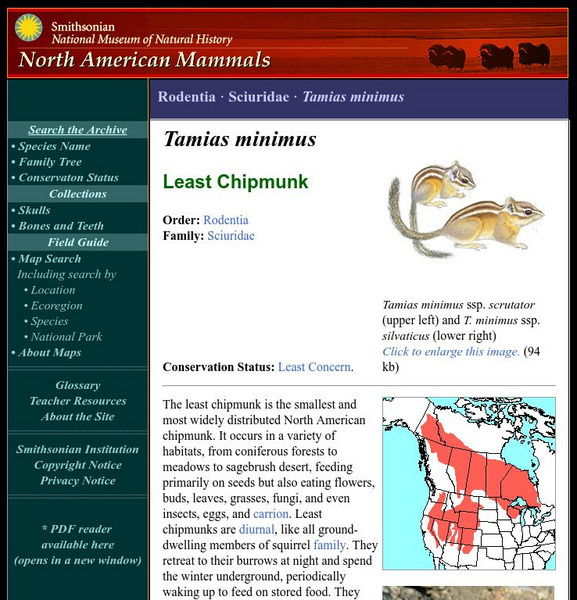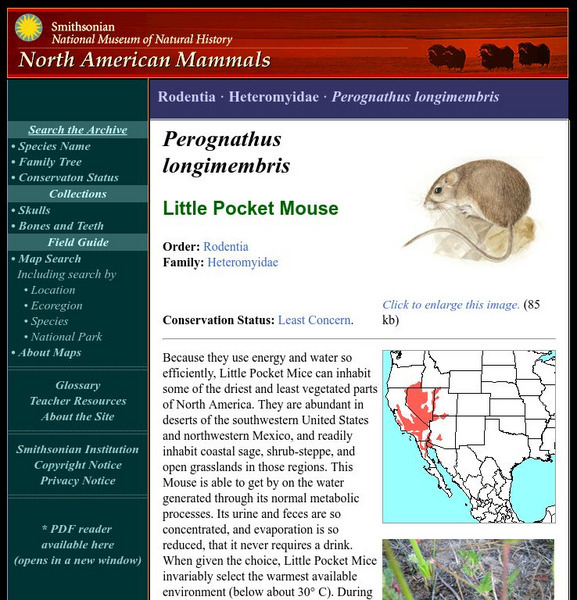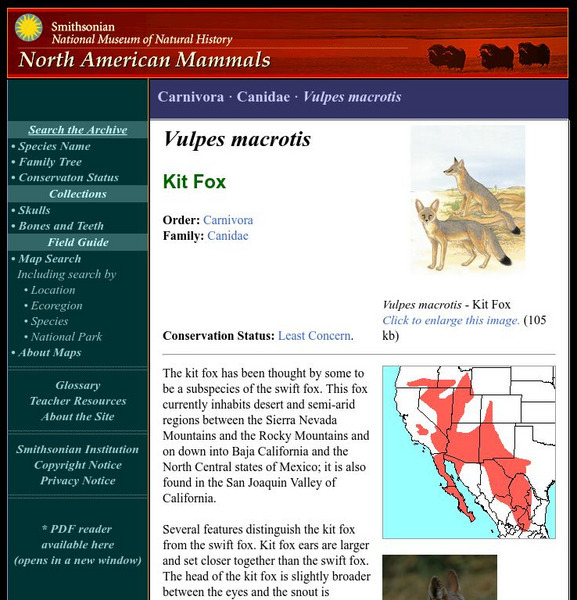ClassFlow
Class Flow: Sonoran Desert
[Free Registration/Login Required] This flipchart is an introduction/review of the climate, the plant life and the animals of the Sonoran Desert. Students will use Activotes, the eraser tool and the pen tool to answer questions about how...
Houghton Mifflin Harcourt
Harcourt: School Publishers: Exploring Ecosystems
Compare and contrast three very different ecosystems - the Sonoran Desert in Arizona, the Florida Everglades, and the Arctic Coastal Plain in Alaska. Learn what makes each of them unique, and about the adaptations plants and animals had...
Curated OER
Etc: Maps Etc: North American Vegetation Regions, 1901
A map from 1901 of North America, Central America, Greenland, and the Caribbean to Puerto Rico showing the general vegetation regions. The map shows areas of deserts, tundras, and ice fields, areas of grassy lands, areas of open forests,...
Smithsonian Institution
National Museum of Natural History: American Mammals: Least Chipmunk
The least chipmunk is the smallest and most widely distributed North American chipmunk. It occurs in a variety of habitats, from coniferous forests to meadows to sagebrush desert, feeding primarily on seeds but also eating flowers, buds,...
Independence Hall Association
U.s. History: Wartime Stategy
Initial focus by the Americans in World War II was containing Germany. Read about the Allied war stategy to "close the ring" and deprive Germany of men and materiel.
PBS
Pbs American Experience: Erwin Rommel (1891 1944)
This site is a brief biography of the military career of Erwin Rommel, the German Field Marshall during WWII.
Smithsonian Institution
National Museum of Natural History: American Mammals: Bobcat
The Bobcat is the most widely distributed native cat in North America. Bobcats occupy many habitat types, from desert to swamp to mountains. Learn more about the Lynx rufus, more commonly known as a Bobcat, in this easy-to-read species...
Smithsonian Institution
National Museum of Natural History: American Mammals: Nelson's Pocket Mouse
Nelson's Pocket Mice live in the Chihuahuan Desert of north-central Mexico and adjacent parts of western Texas and southern New Mexico. They are found mostly in rocky areas where there are some shrubs to provide cover. Learn more about...
Smithsonian Institution
National Museum of Natural History: American Mammals: Little Pocket Mouse
Because they use energy and water so efficiently, Little Pocket Mice can inhabit some of the driest and least vegetated parts of North America. They are abundant in deserts of the southwestern United States and northwestern Mexico, and...
Smithsonian Institution
National Museum of Natural History: American Mammals: Kit Fox
The kit fox has been thought by some to be a subspecies of the swift fox. This fox currently inhabits desert and semi-arid regions between the Sierra Nevada Mountains and the Rocky Mountains and on down into Baja California and the North...
Encyclopedia Britannica
Encyclopedia Britannica: Basin and Range Province
In this entry, you will learn about the physical features and location of the Basin and Range Province in the western United States.












